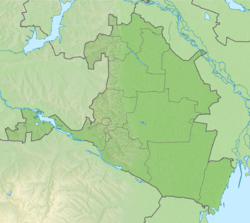Kuma–Manych Depression
Appearance
(Redirected from Kuma-Manych Depression)
Kuma–Manych Depression | |
|---|---|
 Kuma-Manych Depression and Manych River from low Earth orbit. Upper left is the eastern tip of the Sea of Azov and lower right is the Caspian Sea. In the middle of the image is the Lake Manych-Gudilo. Upper right is the Volga and lower left is the Kuban River. | |
| Coordinates: 45°42′54″N 44°06′18″E / 45.715°N 44.105°E |
The Kuma–Manych depression (Russian: Кумо–Манычская впадина, romanized: Kumo–Manychskaya vpadina) is a geological depression in southwestern Russia that separates the Russian Plain to the north from Ciscaucasia to the south.[1] It is named after the Kuma and Manych rivers.[2]
Geography
[edit]
Kuma–Manych depression is sometimes regarded as a definition for the natural boundary between Asia and Europe.[1][3]
The Rostov Nature Reserve is located within the depression.[4]
See also
[edit]References
[edit]- ^ a b "'Kuma-Manych Depression'. Encyclopædia Britannica. Encyclopædia Britannica Online". Encyclopædia Britannica Inc., 2015. Retrieved 3 December 2015.
- ^ Microsoft Encarta World Atlas, 2001, Microsoft Corporation
- ^ "3. The continent – Extent and boundaries". Europe's Environment – The Dobris Assessment. European Environmental Agency. 2011.
- ^ "Rostovsky". The MAB Programme. UNESCO. 14 January 2010. Retrieved 7 December 2013.



